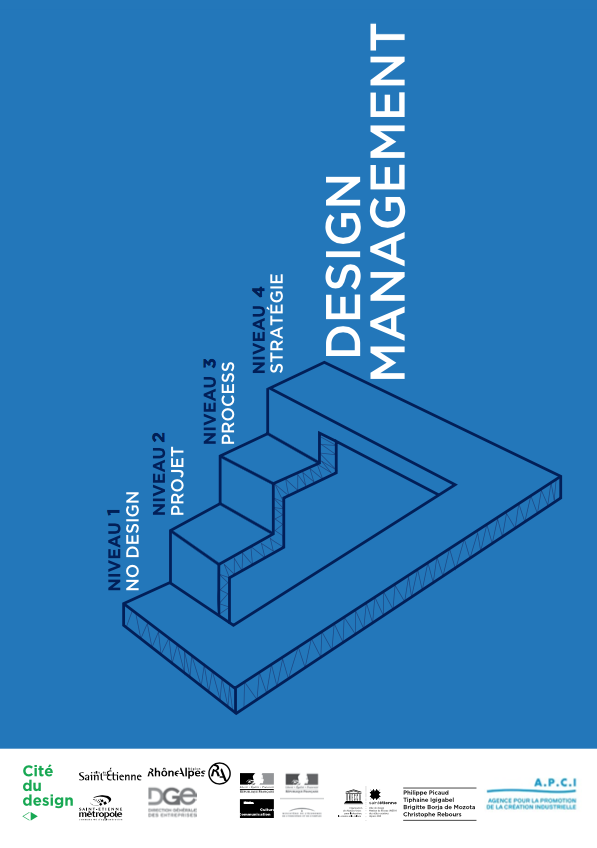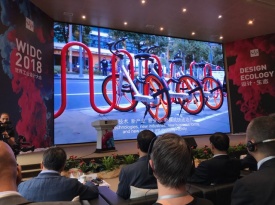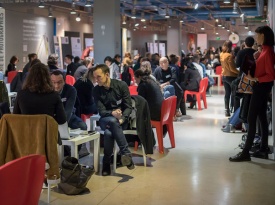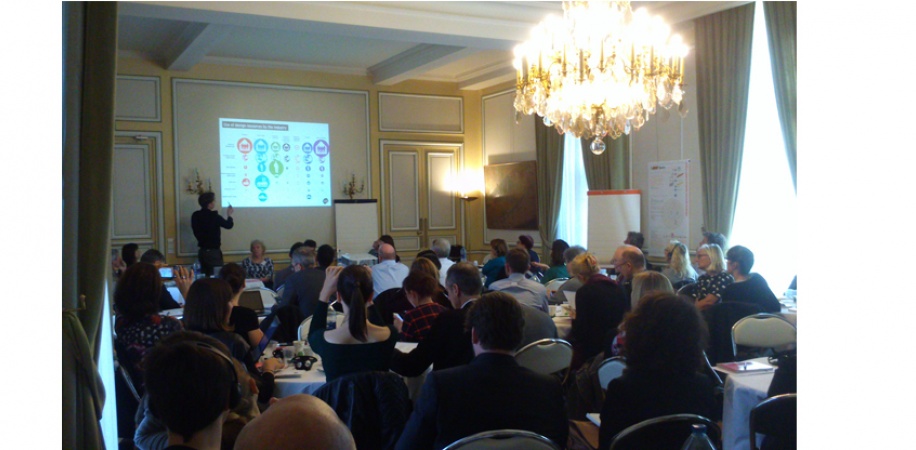
It is now widely accepted that design generates products, services and experiences that are sources of competitiveness. Well-managed design creates innovation and differentiation, strengthens brands and identities, ensures customer satisfaction, and ultimately secures a unique strategic position in the market.
Design management – integration of design in the company’s management –, which should appear as a key driver of any company's strategy, still remains largely unused.
From European experiences (and even Brazilian!), the dissemination of design in the management of companies was discussed in three major ways:
- The institutional programs that support the integration of design in the innovation support schemes
- The tools that enhance the potential contribution of design in the consolidation of the company's strategy
- The possible bridges in the curricula of design, business and engineering schools.
Three topics have been addressed during round tables and/or workshops:
- The European Union supports design
- Encouraging enterprises to consider design as part of their strategy
- Bringing business and engineering schools into the design age
Download the all-day presentation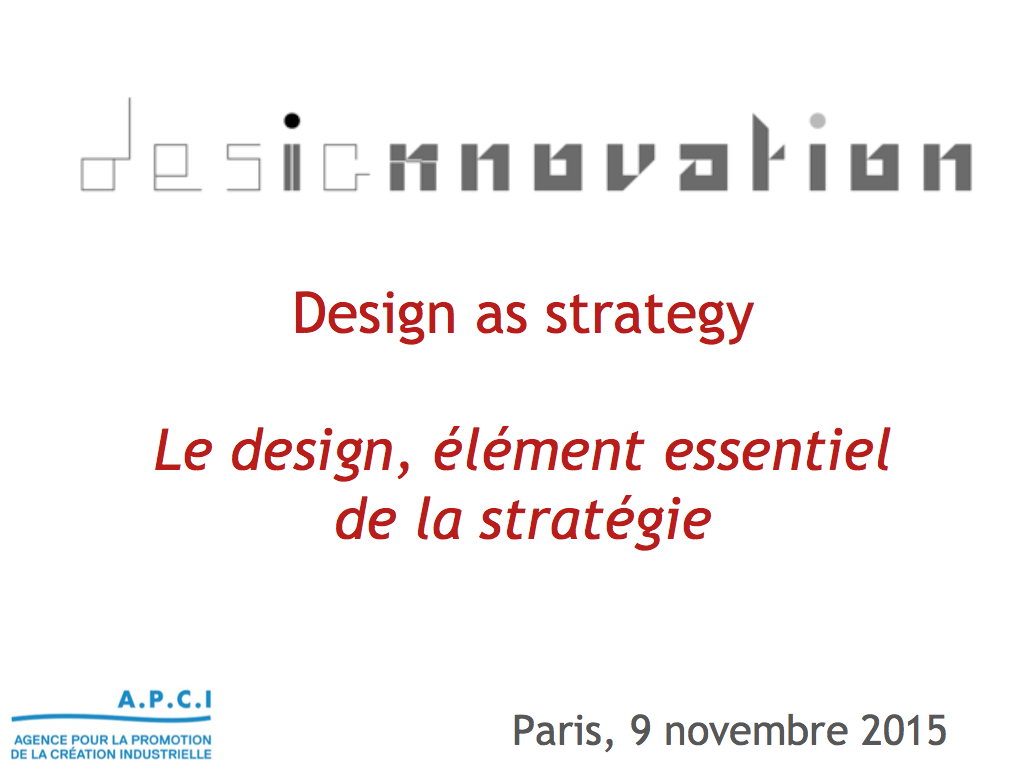 |
Download the conference summary in PDF format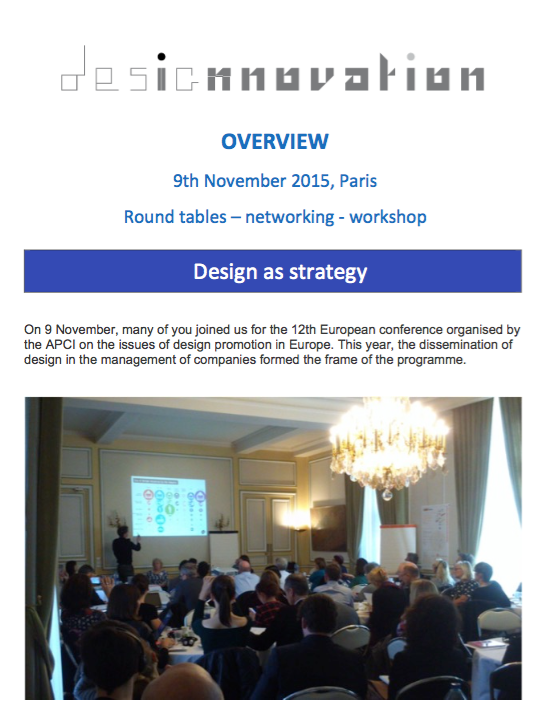 |
To access the presentations, click on the title of each intervention or click on the images to download the full presentation of each round table. Files are large and could require extra time to download...
******************************
ROUND TABLE 1 – "Europe supports design"
For a long time already, design actors meet to exchange and strengthen their actions to promote design (BEDA). The European Commission regards design as a driver for innovation and growth for a decade. This has resulted in a number of calls for projects specifically dedicated to design (and almost exclusively to the "industrial design"). Under programmes such as H2020 or Creative Europe, the extension of the actions is based on the findings of completed projects, resulting in the integration of design in calls to more general projects on innovation or cultural industries. A brief overview...
- European policy "Design for Innovation"
Xavier le Mounier, Policy Officer European Commission, DG Growth – Internal Market, Industry, Entrepreneurship and SMEs - Unit F1 Innovation Policy and Investment for Growth (Brussels)
- "Design for Europe" – Mid-term review and next actions
Ailbhe McNabola, Director of Research & Policy Design Council (UK)
- "Design Europe 2021 – Design for Cultural and Creative Growth’ project"
Robin Edman, President of BEDA (Bureau of European Design Associations) and CEO of SVID (Swedish Industrial Design Foundation - Sweden)
- Creative Europe opens up to design
Laurence Barone, Manager of Europe Créative France, Relais Culture Europe (France)
- ECIA (European Creative Industries Alliance), new perspective
Edgar Garcia Sellas, Director of Department of Business Development ICEC (Institut Català de les Empreses Culturals - Spain)
Download the presentation of the round table 1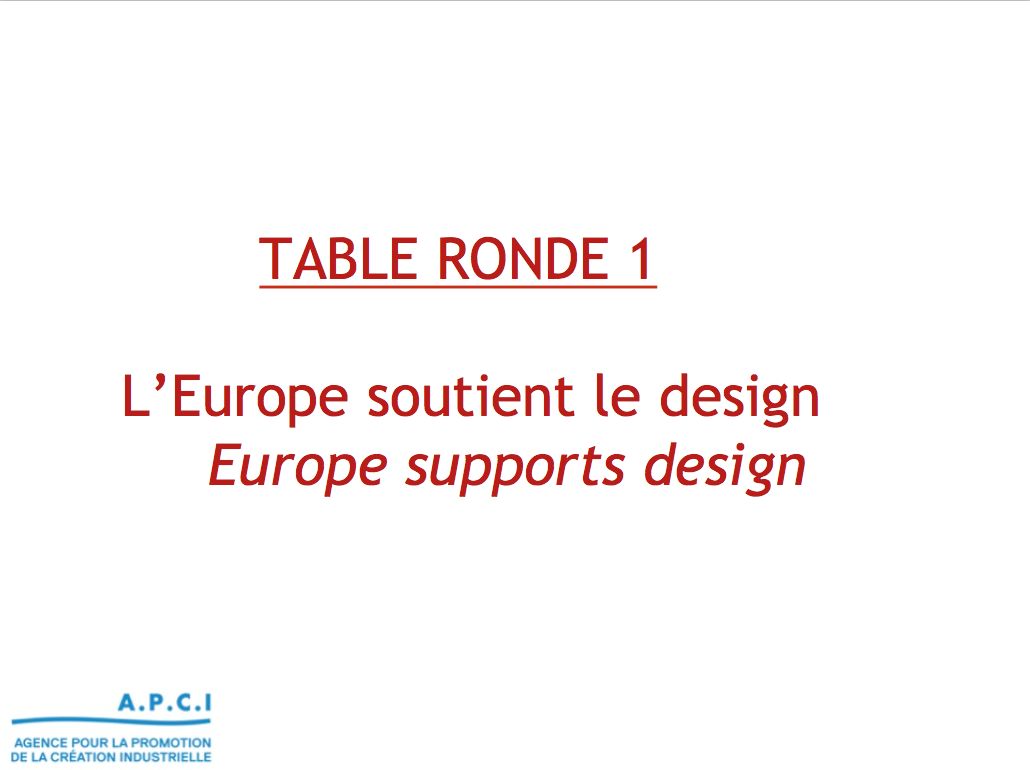
ROUND TABLE 2 – "How can we encourage SMEs to consider design as part of their strategy?"
The British Design Council recently published an economic study that shows once again that design is a driver for innovation and competitiveness, and that it contributes indirectly but significantly to the gross domestic product. The case studies of companies that incorporate design into their strategy demonstrate this reality. Nevertheless, companies, and in particular SMEs, do not appear to perceive it. Actions such as the Awards, the accompaniments, the forums seem to have a limited impact. Should other actors or forms of support be considered? Feedback from experiences...
- The value of design to the UK – The Design Economy 2015
Ailbhe McNabola, Director of Research & Policy, Design Council (UK)
- The DME Award – Design Management Excellence Award
Sally Brazier, Business Consultant and Director of CEOSTRA Ltd (UK), and member of the DME Award Board and of the Design Management Institute Advisory Council
- Design management & SMEs – Feedback from Brazil
Darragh Murphy, Design Management and Innovation Consultant DUCO (Brazil)
- Forum Design & Innovation
Isabelle Vérilhac, Director Pôle Entreprises & Innovation Cité du design de Saint-Etienne (France)
- "Train the trainers", European project EASME H2020 "Capabilities for design-driven innovation in European SMEs"
Andrea Pestarino, Project coordinator D’Appolonia (Italy)
- Case study – How does the enterprise include design in its strategy?
Thuasne : Leader in Europe on the ortheses market – Marie Gérard, Design manager (France)
Download the presentation of the round table 2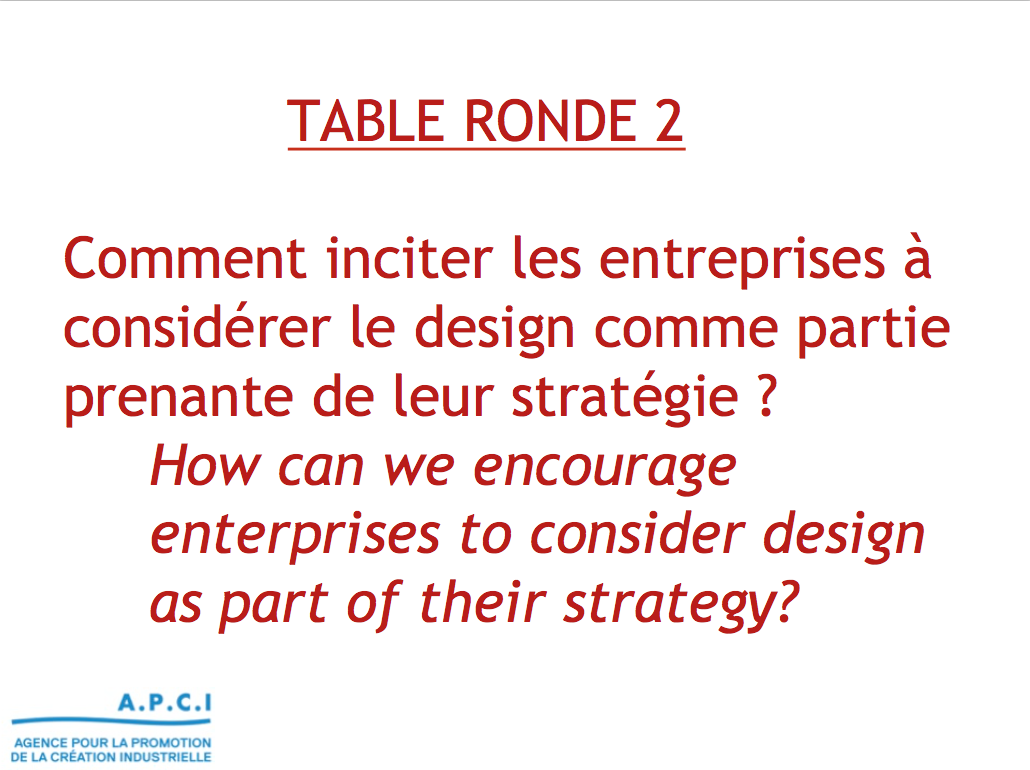
ROUND TABLE 3 & WORKSHOP – "Bringing business and engineering schools into the design age"
By being aware at an early stage of the contribution of design and designers, policy makers and entrepreneurs of tomorrow should include it more spontaneously in their projects. The closer relations between design, business/management and engineering schools are now very numerous and take different forms (merger of schools, common curriculum, cross-cutting workshops, etc.)… What models for which objectives, what are the expected results?
- Introducing design in business schools' case studies
Brigitte Borja de Mozota, Consultante en Design Management (France)
- DESign + MAnagement = DESMA, an initial training network within the area of Design Management
Oriana Haselwanter, DESMA Deputy Project Co-ordinator & Communication Strategist (Sweden)
- International Design Business Management (IDBM), Aalto University schools
Peter McGrory – Professor Department of Design Aalto University (Finland)
- FDE : France Design Education – Building bridges between training programmes
Christian Guellerin, Managing director of L’Ecole de Design Nantes Atlantique, President of FDE and Honorary president of Cumulus (International Association of Universities and Colleges of Art, Design and Media) (France)
- ARTEM : Art, Technologie, Management
Michel Jauzein, Director of Mines Nancy and Delegate general of Artem (France)
Download the presentation of the round table 3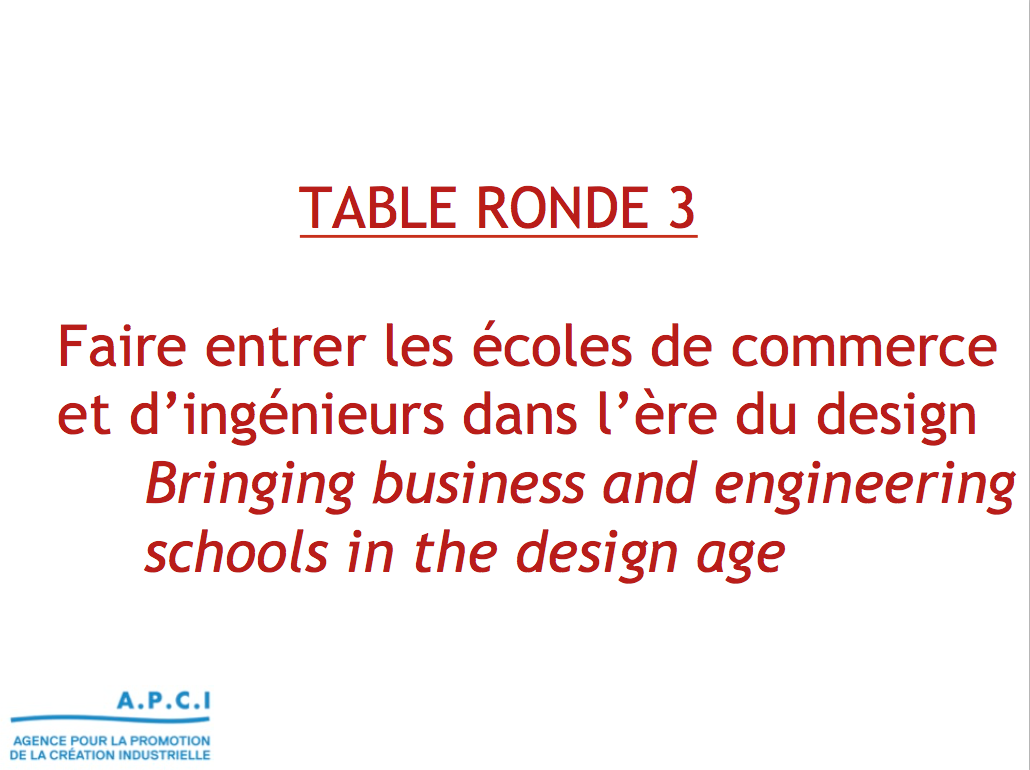
WORKSHOP
By discussing the cases presented, participants were invited to explore new avenues in order that design becomes part of the curricula of business and engineering schools. Discussions confirmed that bringing together students and trainings fosters matching between cultures and working methods that are very different, and shifts position lines. Several paths have been sketched out, worthy of being developed further…
LIVRET DESIGN MANAGEMENT
At the Conference has been circulated the booklet 'Design Management', that presents the success stories of some French companies that have gradually incorporated design into their management and often use it a key competence of their overall strategy.
This booklet is a collective synthesis work based on the book « Design Impact – Quand le design... crée de la valeur pour l’entreprise » (Philippe Picaud, Tiphaine Igigabel, Brigitte Borja de Mozota, Christophe Rebours) and the exhibition « French Design Management Tour » (APCI), and published by the Cité du design Saint-Etienne.
Download the booklet by clicking the image below
| XX |
These case studies are not theoretical since the information comes directly from the concerned companies. Each case study explains the company’s context, its design integration approach (actions, external/internal resources) and the different types of impact (market, positioning, organisation etc.). These companies belong to various lines of businesses (industry, services etc.) and they vary in size but all are innovative, efficient and internationally recognized.
|

For more details: Sandrine Gibet - sgibet@apci.asso.fr

